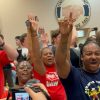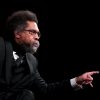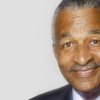Dr. Maulana Karenga
There were numerous rumors and partially reliable reports that the country was shocked and surprised to hear of and see its police in brutal action: killing an unarmed surrendering teen, Michael Brown; attacking peaceful demonstrators and journalists; flashing and using military weapons, vehicles and tactics; and turning the small town of Ferguson, Missouri into a war zone and battlefield. But to those of us whose very life and death depend daily on avoiding, negotiating, and surviving aggressive, abusive and death-dealing police behavior, Ferguson did not come as a surprise, nor did it send us scratching a self-deluding, selfie-diverting head, wondering how could this happen in America. For if America could see itself beyond self-medicating illusions and self-congratulatory narratives of an achieved “more perfect union” and “a post-racial society”, it would see itself from the eyes and experiences of its most vulnerable and victimized. Perhaps, it would then realize that it is in urgent need of a radical restructuring, not only of police policy, procedure and practices, but also of society itself, if it is to achieve anything remotely resembling racial, legal and social justice.
Certainly, it is easy for us to see why many would call or compare Ferguson to “a war zone”, “a scene from the Middle East”, and describe the police as acting like “an occupying army”. Such designations and comparisons arise not only out of people having witnessed in horror and real time the internationally condemned recent Israeli rampage and slaughter in Occupied Palestine. It also is extracted from the extensive evidence history offers of similar practices of occupying armies whether in Haiti, colonial Congo, Kenya and Algeria or Iraq, Afghanistan and other places. It is within this understanding of similarities in oppression and resistance that Palestinian resistance groups and persons sent social media messages of solidarity and support and varied suggestions of how to deal with tear gas attacks by the police to the people of Ferguson.
It is important to note here, however, that although we were not surprised, we never get used to the ongoing targeting, battering and killing, and the awesome toll it takes on the lives and life of our people. Otherwise stated, we will never get used to or accept in submissive silence the structured violence of the unwarranted and undeclared “low-intensity” war against us as a people, and especially us as Black males and men by police across the country who appear and act as an occupying army. And the history of this repression is long, with an equally lengthy record of righteous resistance.
Indeed, since the Sixties, we have often defined the Black community’s and the police’s relationship as that of an occupied people and territory and an occupying army. And we knew then, as we know now, that this occupying army, like all others, is marked by two defining features: a pervasive and sustained use of repressive violence and a deep and often depraved disregard for the life and rights of those under occupation. Moreover, this violence and disregard is to be seen not as the acts of a rogue cop or a department gone-wild, but as culturally-rooted, socially sanctioned, and undergirded with racist notions of human difference and human dignity and thus, of who deserves and does not deserve human rights and required respect. And so, as early as 1965 our organization Us and other community groups created a Community Alert Patrol (CAP) which followed and monitored police activity, informed those stopped and arrested of their rights, and secured pro bono lawyers to assist in this project. Likewise, the community put in place other structures and processes to deal with this serious and ongoing problem of police violence under the cover and camouflage of law.
Certainly, the repeated shooting and killing of an unarmed Black youth with his hands raised in surrender is savage, immoral, illegal and unjustifiable. And it is a persistent pattern of police practices all over the country, making Black mothers and fathers constantly afraid for their male children. Likewise, there’s a history of blaming the victims for their own killing and a White supremacist mentality made even more aggressive by the possession of military weapons and a sense of a socially sanctioned and legally grounded right and responsibility to suppress, humiliate and humble those criminalized by race and deemed unworthy of equal regard. And we are compelled by the insistent demands of our history and humanity to rise up in righteous resistance against such oppression.
The revolt of Black people in Ferguson against aggressive and deadly police violence comes in a month rich in the history of revolution, revolt and radical resistance. I note here the beginning of the Haitian Revolution, August 14, 1791; the Gabriel and Nana Prosser Revolt, August 30, 1800; the Nat Turner Revolt, August 21, 1831; the Watts Revolt, August 11-16, 1965; and the Ferguson Revolt, August 9, 2014. This revolution and these revolts against the Holocaust of enslavement, segregation and racism, in both its raw and re-invented forms, demonstrate the unbreakable will of the people to resist, to be free, to eventually break the back of oppression in all its forms and build a new society and world.
Thus, the sustained resistance in Ferguson is a homage to the history of which it is a part. And to maintain this struggle and keep the fervor and fire of resistance burning, several considerations and commitments are due. Surely, we cannot listen to those who call for a peace without justice and are satisfied with justice as going through procedures rather than producing rightful and due results. Also, we must have an agenda beyond this unjustifiable killing and gross injustice and extend the struggle to deal with police policy, procedure and practice as a whole. It means also establishing a civilian review board to monitor and discipline police behavior and build simultaneously community structures to monitor and hold accountable the civilian review board, which can easily be coopted into the system as a source of civilian sanction of wrong rather than its correction.
Moreover, our agenda must also self-consciously extend from concerns about legal justice to those of social justice with due consideration of how these particularly serve the needs of racial justice. This means, in turn, rebuilding the Movement, moving beyond periodic anger and episodic engagement to an ongoing righteous anger at and resistance to evil and injustice wherever we find it. And it means recapturing and renewing our expansive historical sense of ourselves as a moral and social vanguard, whose moral vision and vocabulary and unrelenting and righteous struggle became an inspiration and instructive model for other oppressed and struggling peoples of the world.
Dr.Maulana Karenga,ProfessorandChairofAfricanaStudies,CaliforniaStateUniversity-Long Beach; Executive Director, AfricanAmerican CulturalCenter(Us);CreatorofKwanzaa;and authorofKwanzaa: ACelebrationofFamily,CommunityandCultureand Introduction to BlackStudies, 4thEdition, www.OfficialKwanzaaWebsite.org;www.MaulanaKarenga.org.















